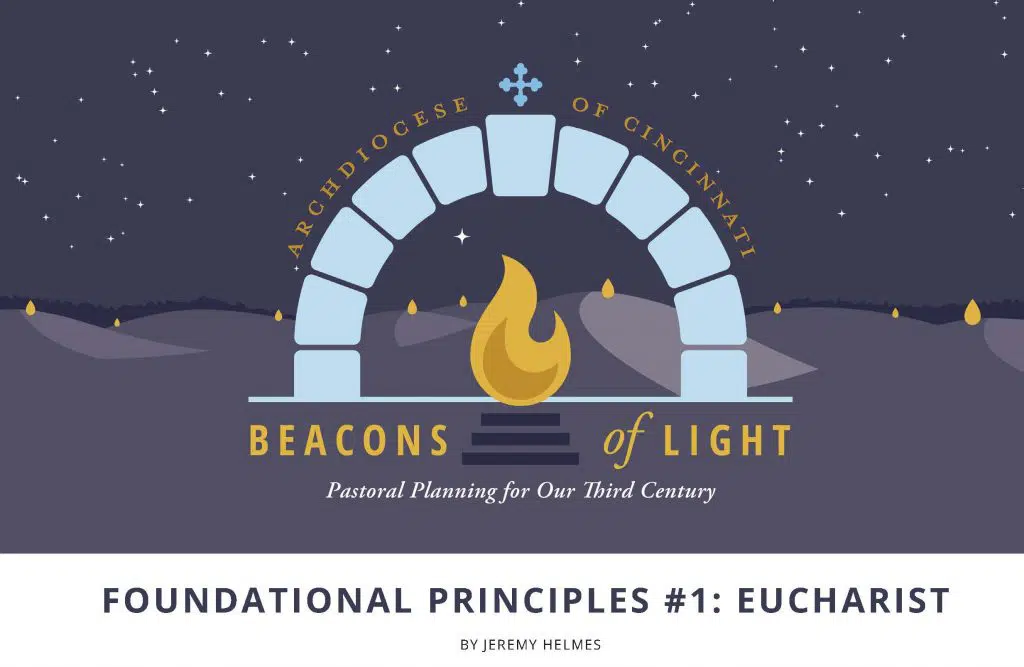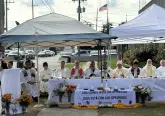Beacons of Light: Foundational Principles #1: Eucharist

This article is the first in a series covering each of the six foundational principles of Beacons of Light, the pastoral planning process of the Archdiocese of Cincinnati.
The Eucharist makes the Church. This simple statement is at the heart of what it means to be a member of the Catholic Church, the community of the baptized who gather each Sunday to do what Jesus commanded: Participate in His Sacrifice on the Cross, sharing a sacred meal – His body and blood – together in His memory.
It’s no surprise, then, that Archbishop Dennis Schnurr established “Eucharist” as Beacons of Light’s first principle with these words:
“The Mass is the source and summit of the whole Christian life. Accordingly, the Eucharist is the essential moment for building up and strengthening the parish community, along with the sacraments and other celebrations of the paschal mystery – the passion, death and resurrection of Jesus Christ.”
Yet, we are experiencing a Eucharistic crisis. Consistent Mass participation is declining nationally, with a sharp drop in attendance locally for the past decade. We anticipate our churches continuing to fill as the pandemic wanes, but attendance to-date remains far below even two years ago.
Perhaps it is partly because parish liturgical life isn’t what it should be. The U.S. Bishops teach: “Good celebrations foster and nourish faith. Poor celebrations may weaken and destroy it.” This includes diminishment of the Eucharist’s importance in our lives – some Catholics even lacking belief in Christ’s Real Presence in the Eucharist.
When parishes shape their new Family and plan a vibrant future together, the Eucharist’s centrality must be upheld. The following goals help parish Families design effective plans that ensure the Eucharist has primary importance.
• The Sunday Eucharist is life-giving, beautiful, and transformative: When gathered for Mass, especially on Sundays, we are changed to be more fully like God. We experience God’s love through the sacraments and He nourishes us for mission so that we can be more faithful disciples and witnesses to the Gospel.
• Christ’s Presence is felt: Sacramental celebrations and other liturgies are unique, privileged and true encounters with Jesus Christ, who is present in Word and Sacrament.
• Unity is lived: As the sacrament of unity (1 Cor. 10:17), Eucharistic celebration is an opportunity for Family parish members to worship together, honoring and celebrating each one’s cultural traditions, particularly special feast days.
• Formation is essential: Catechize (teach and make real) the faithful’s understanding of what they celebrate in the liturgy and how to celebrate it well.
• Ars Celebrandi is faithful and participatory: Grant importance and attention to the “art of celebrating” the liturgy, such that the faithful’s full, conscious and active participation are kindled and drawn more fully into the mystery of Christ through well-prepared preaching and music, fidelity to the texts and rubrics and the prayerful understanding of liturgical texts, feasts and seasons.
• Ministers are formed: Priests, deacons and lay liturgical ministers should be well-trained and formed for pastoral leadership of prayer communities and imbued with the spirit of the liturgy.
• Sacred Space leads to God: Churches, chapels and other sacred buildings are houses of the Church and houses of God: they should be “truly worthy and beautiful, signs and symbols of heavenly realities.”
• Adoration is encouraged: Adoration of the Blessed Sacrament, and catechesis regarding this holy practice, are readily available to prolong the Eucharistic Presence of Christ we experience at Mass and to adore Him as a community, even outside of Mass.
As we, together, plan our future in Families of Parishes, the primacy of the Eucharist comes to fruition through the prayer and hard work of both parish leaders and all the faithful. There may be difficult adjustments: changes to Mass schedules, new musical repertoires, new needs for liturgical ministers, and more. Through all of these efforts, we are called to uphold the Eucharist as the heart and center of parish Family life.













